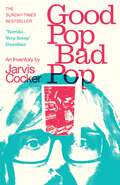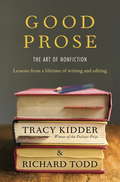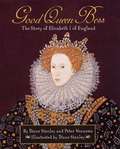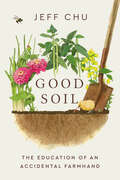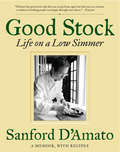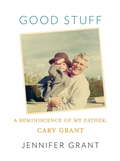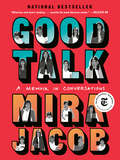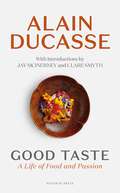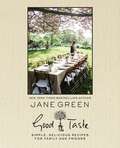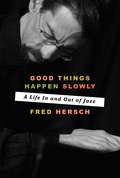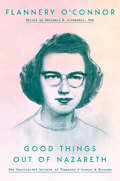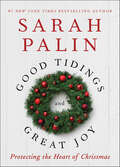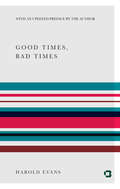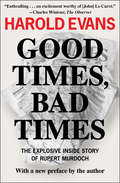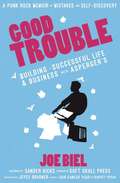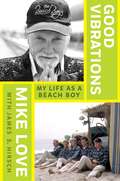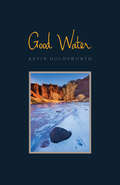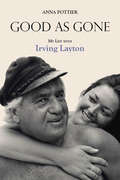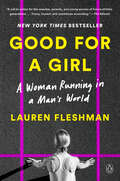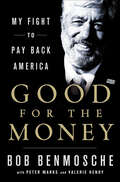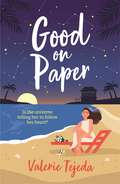- Table View
- List View
Good Night, Beloved Comrade: The Letters of Denton Welch to Eric Oliver
by Daniel J. MurtaughDenton Welch (1915–48) died at the age of thirty-three after a brief but brilliant career as a writer and painter. The revealing, poignant, impressionistic voice that buoys his novels was much praised by critics and literati in England and has since inspired creative artists from William S. Burroughs to John Waters. His achievements were all the more remarkable because he suffered from debilitating spinal and pelvic injuries incurred in a bicycle accident at age eighteen. Though German bombs were ravaging Britain, Welch wrote in his published work about the idyllic landscapes and local people he observed in Kent. There, in 1943, he met and fell in love with Eric Oliver, a handsome, intelligent, but rather insecure “landboy”—an agricultural worker with the wartime Land Army. Oliver would become a companion, comrade, lover, and caretaker during the last six years of Welch’s life. All fifty-one letters that Welch wrote to Oliver are collected and annotated here for the first time. They offer a historical record of life amidst the hardship, deprivation, and fear of World War II and are a timeless testament of one young man’s tender and intimate emotions, his immense courage in adversity, and his continual struggle for love and creative existence.
Good Pop, Bad Pop: The Sunday Times bestselling hit from Jarvis Cocker
by Jarvis CockerThe Sunday Times bestselling hit memoir from Pulp frontman Jarvis Cocker.'It's real gold... its storytelling first class' Sunday TimesWhat if the things we keep hidden say more about us than those we put on display?We all have a random collection of the things that made us - photos, tickets, clothes, souvenirs, stuffed in a box, packed in a suitcase, crammed into a drawer. When Jarvis Cocker starts clearing out his loft, he finds a jumble of objects that catalogue his story and ask him some awkward questions:Who do you think you are?Are clothes important?Why are there so many pairs of broken glasses up here?From a Gold Star polycotton shirt to a pack of Wrigley's Extra, from his teenage attempts to write songs to the Sexy Laughs Fantastic Dirty Joke Book, this is the hard evidence of Jarvis's unique life, Pulp, 20th century pop culture, the good times and the mistakes he'd rather forget.This is not a life story. It's a loft story.'Nostalgic, playful and beautifully designed' Daily Mail'Brilliant...lurid, entertaining' Daily Telegraph'Terrific... Very funny' Guardian* A Book of the Year in the Daily Telegraph, Financial Times, Daily Mail and Uncut *
Good Prose
by Tracy Kidder Richard ToddGood Prose is an inspiring book about writing--about the creation of good prose--and the record of a warm and productive literary friendship. The story begins in 1973, in the offices of The Atlantic Monthly, in Boston, where a young freelance writer named Tracy Kidder came looking for an assignment. Richard Todd was the editor who encouraged him. From that article grew a lifelong association. Before long, Kidder's The Soul of a New Machine, the first book the two worked on together, had won the Pulitzer Prize. It was a heady moment, but for Kidder and Todd it was only the beginning of an education in the art of nonfiction. Good Prose explores three major nonfiction forms: narratives, essays, and memoirs. Kidder and Todd draw candidly, sometimes comically, on their own experience--their mistakes as well as accomplishments--to demonstrate the pragmatic ways in which creative problems get solved. They also turn to the works of a wide range of writers, novelists as well as nonfiction writers, for models and instruction. They talk about narrative strategies (and about how to find a story, sometimes in surprising places), about the ethical challenges of nonfiction, and about the realities of making a living as a writer. They offer some tart and emphatic opinions on the current state of language. And they take a clear stand against playing loose with the facts. Their advice is always grounded in the practical world of writing and publishing. Good Prose--like Strunk and White's The Elements of Style--is a succinct, authoritative, and entertaining arbiter of standards in contemporary writing, offering guidance for the professional writer and the beginner alike. This wise and useful book is the perfect companion for anyone who loves to read good books and longs to write one.Praise for Good Prose "Good Prose: The Art of Nonfiction takes us into the back room behind the shop, where strong, effective, even beautiful sentences are crafted. Tracy Kidder and his longtime editor, Richard Todd, offer lots of useful advice, and, still more, they offer insight into the painstaking collaboration, thoughtfulness, and hard work that create the masterful illusion of effortless clarity."--Stephen Greenblatt, author of The Swerve: How the World Became Modern"Good Prose offers consummate guidance from one of our finest writers and his longtime editor. Explaining that 'the techniques of fiction never belonged exclusively to fiction,' Kidder and Todd make a persuasive case that 'no techniques of storytelling are prohibited to the nonfiction writer, only the attempt to pass off invention as facts.' Writers of all stripes, from fledgling journalists to essayists of the highest rank, stand to benefit from this engrossing manual."--Jon Krakauer, author of Into the Wild "What a pleasure to read a book about good prose written in such good prose! It will make many of its readers better writers (though none as good as Tracy Kidder, who sets an impossible standard), and it will make all of them wish they could hire Richard Todd to work his editorial magic on their words."--Anne Fadiman, author of The Spirit Catches You and You Fall Down
Good Queen Bess: The Story Of Elizabeth I Of England
by Diane Stanley Vennema Peter VennemaShe was a queen whose strong will, shrewd diplomacy, religious tolerance and great love for her subjects won the hearts of her people and the admiration of her enemies. Elizabeth was born into an age of religious strife, in which plots and factions were everywhere and private beliefs could be punished by death. When she became queen, her counselors urged her to marry quickly and turn the responsibilities of governing over to her husband, But she outwitted them by stalling, changing her mind; and playing one side against another, as she steered her country to the glorious era of peace and security that would be called the Elizabethan Age. Elizabeth's forceful personality, colorful court, and devoted subjects come vividly to life in this stellar picture-book biography. When it was first published, Good Queen Bess was named a Notable Book in the Field of Social Studies, an American Library Association Notable Book, a Booklist Editors' Choice, an American Bookseller Pick of the Lists, a Boston Globe-Horn Book Honor Book, and an IRA Teachers' Choice. In this welcome reissue, celebrated author and illustrator Diane Stanley and her husband, Peter Vennema, paint an impressive portrait of the remarkable queen who loved her people so dearly and ruled them so well.
Good Soil: The Education of an Accidental Farmhand
by Jeff ChuA profound meditation on nature, heritage, and belonging, from an accomplished journalist who left New York City for life on a working farm&“I needed this book. I think you need it, too.&”—Maggie Smith, New York Times bestselling author of You Could Make This Place BeautifulIn his late thirties, Jeff Chu left his job as a magazine writer and found himself at Princeton Theological Seminary&’s &“Farminary&”—a twenty-one-acre working farm where students learn to cultivate the earth while examining life&’s biggest questions. Now, he unpacks what he learned about creating &“good soil,&” both literally and figuratively, drawing lessons from the rhythms of growth, decay, and regeneration that define life on the land.In gorgeous, transporting reflections, Chu introduces us to the cast of characters, human and not, who became his teachers. While observing the egrets that visit the pond, the worms that turn waste into fertile soil, and the Chinese long beans that get passed over in the farm&’s CSA, Chu considers our desire to belong, the story behind the food on our plate, and the significance of his own roots. What is the earth trying to tell us, if we&’ll only stop and listen?Good Soil helps readers connect to the land and to one another at a time when we seem drawn most to the phones in our hands. For nature lovers, foodies, and anyone who has daydreamed about a more fulfilling life, this book is a tribute to friendship, to the sacredness of our bond with the natural world, and to how love can grow from the unlikeliest of places.
Good Stock: Life on a Low Simmer
by Bob Spitz Sanford D'Amato Kevin J. MiyazakiGood Stock is the story of Sanford "Sandy" D'Amato's journey from young Italian kid who loved to cook to unknown culinary student with a passion for classical French cuisine to one of the most respected chefs and restaurateurs in the country. Featuring more than 80 recipes and full-color photography throughout, Good Stock weaves together memoir and cookbook in an beautiful and engaging package.Sanford, the restaurant D'Amato opened in 1989 and sold to his longtime chef de cuisine in December 2012, has been one of the highest-rated restaurants in America over the past 20 years, earning accolades from Bon Appétit, Gourmet, Food & Wine, Esquire, Wine Spectator, Zagat Guide, and the James Beard Foundation. D'Amato has cooked for the Dalai Lama and the 2002 Salt Lake City Olympics, and was one of 12 chefs chosen by Julia Child herself to cook for her 80th birthday celebration. The story of Sanford and Sandy D'Amato is in part the story of America's embrace of fine dining and its acceptance of chefs as master craftsmen.Over the past quarter century, America has seen a rise in the prominence of "celebrity chefs," to the extent that it's difficult to remember a time when becoming a chef was considered a backup plan more than a craft. That transformation began in the 1970s, right around when Sanford D'Amato was studying at the fabled Culinary Institute of America. This was a time when American cooks were by and large being frozen out by French chefs who didn't believe the Americans had what it took to create great cuisine. D'Amato, through persistence, skill, and the help of his mentor, Chef Peter Von Erp, became the first American cook at Le Veau d'Or and worked under Chef Roland Chenus through the groundbreaking opening of Le Chantilly. Soon the heyday of classic French cuisine began to waned, as rising chefs like D'Amato began leading the spread "New American" dining.To D'Amato, though, the Midwest always signified home. His culinary inventiveness was inspired in part by his childhood home, located above his grandparents' grocery store on the lower east side of Milwaukee. It was a small apartment constantly filled with the sights of carefully prepared delicacies, the smells of rich foods on the simmer, and the many tastes of generations-old Italian recipes. Drawing on this influence, as well as his rigorous training in classic French technique, D'Amato eventually opened Sanford in the same space his grandparents' grocery store occupied.In telling his story, D'Amato studs his narrative with 80 of his favorite recipes. The book features both personal photos from his background and career as well as beautiful images of finished recipes.Readers of Good Stock will come to believe, as D'Amato does, that to create great food, it doesn't matter if you're preparing a grilled hot dog or pan-roasted monkfish-- what matters is that you treat all dishes with equal love, soul, and respect, and try to elevate each dish to its ultimate level of flavor. Good Stock combines Midwestern charm with international appeal as the perfect book for aspiring chefs, culinary students, and foodies everywhere.
Good Stuff
by Jennifer GrantJennifer Grant is the only child of Cary Grant, who was, and continues to be, the epitome of all that is elegant, sophisticated, and deft. Almost half a century after Cary Grant's retirement from the screen, he remains the quintessential romantic comic movie star. He stopped making movies when his daughter was born so that he could be with her and raise her, which is just what he did. Good Stuff is an enchanting portrait of the profound and loving relationship between a daughter and her father, who just happens to be one of America's most iconic male movie stars.Cary Grant's own personal childhood archives were burned in World War I, and he took painstaking care to ensure that his daughter would have an accurate record of her early life. In Good Stuff, Jennifer Grant writes of their life together through her high school and college years until Grant's death at the age of eighty-two. Cary Grant had a happy way of living, and he gave that to his daughter. He invented the phrase "good stuff" to mean happiness. For the last twenty years of his life, his daughter experienced the full vital passion of her father's heart, and she now--delightfully--gives us a taste of it. She writes of the lessons he taught her; of the love he showed her; of his childhood as well as her own . . . Here are letters, notes, and funny cards written from father to daughter and those written from her to him . . . as well as bits of conversation between them (Cary Grant kept a tape recorder going for most of their time together).She writes of their life at 9966 Beverly Grove Drive, living in a farmhouse in the midst of Beverly Hills, playing, laughing, dining, and dancing through the thick and thin of Jennifer's growing up; the years of his work, his travels, his friendships with "old Hollywood royalty" (the Sinatras, the Pecks, the Poitiers, et al.) and with just plain-old royalty (the Rainiers) . . . We see Grant the playful dad; Grant the clown, sharing his gifts of laughter through his warm spirit; Grant teaching his daughter about life, about love, about boys, about manners and money, about acting and living.Cary Grant was given the indefinable incandescence of charm. He was a pip . . . Good Stuff captures his special quality. It gives us the magic of a father's devotion (and goofball-ness) as it reveals a daughter's special odyssey and education of loving, and being loved, by a dad who was Cary Grant.From the Hardcover edition.
Good Talk: A Memoir in Conversations
by Mira JacobNATIONAL BESTSELLER • A &“beautiful and eye-opening&” (Jacqueline Woodson), &“hilarious and heart-rending&” (Celeste Ng) graphic memoir about American identity, interracial families, and the realities that divide us, from the acclaimed author of The Sleepwalker&’s Guide to Dancing.ONE OF THE TEN BEST BOOKS OF THE YEAR: Chicago Tribune, The New York Public Library, Publishers Weekly • ONE OF THE BEST BOOKS OF THE YEAR: The New York Times Book Review, Time, BuzzFeed, Esquire, Literary Journal, Kirkus Reviews&“How brown is too brown?&”&“Can Indians be racist?&”&“What does real love between really different people look like?&”Like many six-year-olds, Mira Jacob&’s half-Jewish, half-Indian son, Z, has questions about everything. At first they are innocuous enough, but as tensions from the 2016 election spread from the media into his own family, they become much, much more complicated. Trying to answer him honestly, Mira has to think back to where she&’s gotten her own answers: her most formative conversations about race, color, sexuality, and, of course, love. Written with humor and vulnerability, this deeply relatable graphic memoir is a love letter to the art of conversation—and to the hope that hovers in our most difficult questions.LONGLISTED FOR THE PEN/OPEN BOOK AWARD &“Jacob&’s earnest recollections are often heartbreaking, but also infused with levity and humor. What stands out most is the fierce compassion with which she parses the complexities of family and love.&”—Time&“Good Talk uses a masterful mix of pictures and words to speak on life&’s most uncomfortable conversations.&”—io9&“Mira Jacob just made me toss everything I thought was possible in a book-as-art-object into the garbage. Her new book changes everything.&”—Kiese Laymon, New York Times bestselling author of Heavy
Good Taste
by Alain DucasseA memoir and manifesto from the world's most Michelin starred chef, Alain Ducasse, with introductions by internationally renowned writer Jay McInerney and chef Clare Smyth. At twelve years old, Alain Ducasse had never been to a restaurant. Less than fifteen years later, he received his first Michelin star. Today he is one of just two chefs to have been awarded twenty-one stars. Now, for the very first time, Ducasse shares a lifetime of culinary inspirations and passions in a book that is part memoir and part manifesto. Good Taste takes us on a journey from his childhood, where he picked mushrooms with his grandfather on a farm in Les Landes, to setting up groundbreaking schools and restaurants across the world. He is now taking off his chef's whites and passing on what he knows to the next generation. Ducasse writes a poignant ode to the humble vegetables that have inspired his entire cuisine and to the masters that guided him along the way, from Paris to New York to Tokyo. As he looks to the future, he reflects on just what 'good taste' means.
Good Taste: Simple, Delicious Recipes for Family and Friends
by Jane GreenA lush and gorgeous guide to all things food and entertaining from Jane Green, New York Times bestselling author of Jemima J, The Beach House, and Falling. Jane Green's life has always revolved around her kitchen... ... from inviting over friends for an impromptu brunch; to wowing guests with delicious new recipes; to making sure her ever-on-the-move family makes time to sit down together. For Jane, food is enjoyable because of the people surrounding it and the pleasures of hosting and nourishing those she cares about, body and soul. Now, Jane opens wide the doors of her stunning home to share tips on entertaining, ideas for making any gathering a cozy yet classy affair, and some of her favorite dishes, ranging from tempting hors d'oeuvres like Sweet Corn and Chili Soup, to mouthwatering one-pot mains like Slow-Braised Onion Chicken, to sinfully satisfying desserts like Warm Chocolate and Banana Cake. This book is Jane's perfect recipe for making a wonderful life complete with friends, loving family, and moments filled with good food, good times, and, of course, Good Taste.From the Hardcover edition.
Good Things Happen Slowly: A Life In and Out of Jazz
by Fred HerschJazz could not contain Fred Hersch. Hersch’s prodigious talent as a sideman—a pianist who played with the giants of the twentieth century in the autumn of their careers, including Art Farmer and Joe Henderson—blossomed further in the eighties and beyond into a compositional genius that defied the boundaries of bop, sweeping in elements of pop, classical, and folk to create a wholly new music. <p><p> Good Things Happen Slowly is his memoir. It’s the story of the first openly gay, HIV-positive jazz player; a deep look into the cloistered jazz culture that made such a status both transgressive and groundbreaking; and a profound exploration of how Hersch’s two-month-long coma in 2007 led to his creating some of the finest, most direct, and most emotionally compelling music of his career. <p> Remarkable, and at times lyrical, Good Things Happen Slowly is an evocation of the twilight of Post-Stonewall New York, and a powerfully brave narrative of illness, recovery, music, creativity, and the glorious reward of finally becoming oneself.
Good Things out of Nazareth: The Uncollected Letters of Flannery O'Connor and Friends
by Flannery O'ConnorA literary treasure of over one hundred unpublished letters from National Book Award-winning author Flannery O'Connor and her circle of extraordinary friends. Flannery O'Connor is a master of 20th-century American fiction, joining, since her untimely death in 1964, the likes of Hawthorne, Hemingway, and Faulkner. Those familiar with her work know that her powerful ethical vision was rooted in a quiet, devout faith that informed all she wrote and did. Good Things out of Nazareth, a much-anticipated collection of many of O'Connor's unpublished letters, along with those of literary luminaries such as Walker Percy (author of The Moviegoer), Robert Giroux, Caroline Gordon (author of None Shall Look Back), Katherine Anne Porter (Ship of Fools), and movie critic Stanley Kauffmann, explores such themes as creativity, faith, suffering, and writing. Brought together they form a riveting literary portrait of these friends, artists, and thinkers. Here we find their joys and loves, as well as their trials and tribulations as they struggle with doubt and illness while championing their Christian beliefs and often confronting racism in American society during the Civil Rights era.Advance praise for Good Things Out of Nazareth“An epistolary group portrait that will appeal to readers interested in the Catholic underpinnings of O'Connor's life and work . . . These letters by the National Book Award–winning short story writer and her friends alternately fit and break the mold. Anyone looking for Southern literary gossip will find plenty of barbs. . . . But there’s also higher-toned talk on topics such as the symbolism in O’Connor’s work and the nature of free will.”—Kirkus Reviews “A fascinating set of Flannery O’Connor’s correspondence . . . The compilation is highlighted by gems from O’Connor’s writing mentor, Caroline Gordon. . . . While O’Connor’s milieu can seem intimidatingly insular, the volume allows readers to feel closer to the writer, by glimpsing O’Connor’s struggles with lupus, which sometimes leaves her bedridden or walking on crutches, and by hearing her famously strong Georgian accent in the colloquialisms she sprinkles throughout the letters. . . . This is an important addition to the knowledge of O’Connor, her world, and her writing.”—Publishers Weekly
Good Tidings and Great Joy: Protecting the Heart of Christmas
by Sarah PalinIn her New York Times bestsellers Going Rogue and America by Heart, Sarah Palin revealed the strong Christian faith that has guided her life and family. In Good Tidings and Great Joy she calls for bringing back the freedom to express the Christian values of the season. She asserts the importance of preserving Jesus Christ in Christmas—in public displays, school concerts, pageants, and our expressions to one another other—and laments the over-commercialization and homogenization of Christmas in today's society.Interwoven throughout are personal memories and family traditions, as well as more than a dozen family photos, which illustrate the reasons why the celebration of Jesus Christ's nativity is the centerpiece of her faith. Palin believes it is imperative that we stand up for our beliefs before the element of faith in a glorious and traditional holiday like Christmas is marginalized and ignored. She also encourages readers to see what is possible when we unite in defense of our religious convictions and ignore the politically correct Scrooges seeking to take Christ out of Christmas. Good Tidings and Great Joy is a call to action to openly celebrate the joys of Christianity, and say Merry Christmas to one another.
Good Time Girl
by Heather GayThe instant New York Times bestselling author of Bad Mormon and breakout star of The Real Housewives of Salt Lake City returns with a hilarious, illustrative, and deeply reflective book about life and love as a former Mormon, mother, and reality TV star.In Bad Mormon, Heather Gay pulled back the veil on her orthodox adolescence and marriage in the Mormon Church, and the painful process of leaving it all behind. Becoming a successful business owner and reality TV star gave the single mom of three a second lease on life. After years of living in an insular bubble, Heather emerged bright-eyed, eager to take on the world…no matter how ill-equipped her upbringing may have left her. Now, in this provocative and laugh-out-loud funny book, the mother of three proves that she isn&’t just a Bad Mormon; she&’s also a Good Time Girl! With her &“thoughtful, smart, and funny&” (Kirkus Reviews) writing, Heather recounts the humorous trysts, mishaps, and serendipitous success she&’s found as a life-long reveler in all things indulgent. Coming off the heels of the most-watched RHOSLC episode of all time, Heather gives readers a behind-the-scenes look at the receipts, proof, timeline, and screenshots of that fateful night in Bermuda. From illicit high school trips to Tijuana and awkward dates set up by her overzealous costars, Good Time Girl is a charming and intimate meditation on community, love, independence, womanhood, and—most importantly—second chances.
Good Times, Bad Times
by Sir Harold EvansIn Harold Evans’s classic memoir, he tells the inside story of Rupert Murdoch’s takeover of the Times of London and his rise to become a global media powerIn 1981, Harold Evans was the editor of one of Britain’s most prestigious publications, the Sunday Times, which had thrived under his watch. When Australian publishing baron Rupert Murdoch bought the daily Times of London, he persuaded Evans to become its editor with guarantees of editorial independence. But after a year of broken promises and conflict over the paper’s direction, Evans departed amid an international media firestorm. Evans’s story is a gripping behind-the-scenes look at Murdoch’s ascension to global media magnate. It is Murdoch laid bare, an intimate account of a man using the power of his media empire for his own ends. Riveting, provocative, and insightful, Good Times, Bad Times is as relevant today as when it was first written. This book features a new preface by the author, in which he discusses the Rupert Murdoch phone-hacking scandal.
Good Times, Bad Times: The Explosive Inside Story of Rupert Murdoch
by Harold EvansA renowned journalist&’s &“vivid&” account of his battle with Murdoch after the global media baron bought the Times of London (Chicago Tribune). In 1981, Harold Evans was the editor of one of Britain&’s most prestigious publications, the Sunday Times, which had thrived under his watch. When Australian publishing baron Rupert Murdoch bought the daily Times of London, he persuaded Evans to become its editor with guarantees of editorial independence. But after a year of broken promises and conflict over the paper&’s direction, Evans departed amid an international media firestorm. Evans&’s story is a gripping, behind-the-scenes look at Murdoch&’s ascension to global media magnate. It is Murdoch laid bare, an intimate account of a man using the power of his media empire for his own ends. Riveting, provocative, and insightful, Good Times, Bad Times is as relevant today as when it was first written. With details on the scandalous deal between Murdoch and Margaret Thatcher, this updated ebook edition includes an extensive new preface by Evans, the New York Times–bestselling author of Do I Make Myself Clear?, discussing the Rupert Murdoch phone-hacking scandal.
Good Trouble: Building a Successful Life and Business with Asperger's (Punx Ser.)
by Sander Hicks Joe Biel Joyce Brabner<p>In 1996, everything about Joe Biel's life seemed like a mistake. He was 18, he lived in Cleveland, he got drunk every day, and he had mystery health problems and weird social tics. <p>All his friends' lives were as bad or worse. To escape a nihilistic, apocalyptic worldview and to bring reading and documentation into a communal punk scene, he started assembling zines and bringing them in milk crates to underground punk shows. Eventually this became Microcosm Publishing. But Biel's head for math was stronger than his ability to relate to people, and it wasn't until he was diagnosed with Asperger's Syndrome that it all began to fall into place. <p>This is the story of how, over 20 years, one person turned a litany of continuing mistakes and seeming wrong turns into a happy, fulfilled life and a thriving publishing business that defies all odds.</p>
Good Vibrations: My Life as a Beach Boy
by James S. Hirsch Mike Love<P>Mike Love tells the story of his legendary, raucous, and ultimately triumphant five-decade career as the front man of The Beach Boys, the most popular American band in history -- timed to coincide with the 50th anniversary of "Good Vibrations." The eBook edition includes 85 additional photos. <P>As a founding member of The Beach Boys, Mike Love has spent an extraordinary fifty-five years, and counting, as the group's lead singer and one of its principal lyricists. The Beach Boys, from their California roots to their international fame, are a unique American story -- one of overnight success and age-defying longevity; of musical genius and reckless self-destruction; of spirituality, betrayal, and forgiveness -- and Love is the only band member to be part of it each and every step. His own story has never been fully told, of how a sheet-metal apprentice became the quintessential front man for America's most successful rock band, singing in more than 5,600 concerts in 26 countries. <P>Love describes the stories behind his lyrics for pop classics such as "Good Vibrations," "California Girls," "Surfin' USA," and "Kokomo," while providing vivid portraits of the turbulent lives of his three gifted cousins, Brian, Dennis, and Carl Wilson. His partnership with Brian has few equals in American pop music, though Mike has carved out a legacy of his own -- he co-wrote the lyrics to eleven of the twelve original Beach Boy songs that were top 10 hits while providing the lead vocals on ten of them. <P>The band's unprecedented durability also provides a glimpse into America's changing cultural mores over the past half century, while Love himself has experienced both the diabolical and the divine -- from Charles Manson's "family" threatening his life to Maharishi instilling it with peace. A husband, a father, and an avid environmentalist, Love has written a book that is as rich and layered as the Beach Boy harmonies themselves. <P><b>A New York Times Bestseller</b>
Good Water
by Kevin Holdsworth"In essays that combine memoir with biography of place, Kevin Holdsworth creates a public history of the land he calls home: Good Water, Utah. The high desert of south-central Utah is at the heart of the stories he tells here--about the people, the "survivors and casualties" of the small, remote town--and is at the heart of his own story.Holdsworth also explores history at a personal level: how Native American history is preserved by local park officials; how Mormon settlers adapted to remote, rugged places; how small communities attract and retain those less likely to thrive closer to population centers; and how he became involved in local politics. He confronts the issues of land use and misuse in the West, from the lack of water to greed and corruption over natural resources, but also considers life's simple pleasures like the value of scenery and the importance of occasionally tossing a horseshoe.Good Water's depiction of modern-day Utah and exploration of friendships and bonding on the Western landscape will fascinate and entice readers in the West and beyond."
Good Water
by Kevin HoldsworthIn essays that combine memoir with biography of place, Kevin Holdsworth creates a public history of the land he calls home: Good Water, Utah. The high desert of south-central Utah is at the heart of the stories he tells here—about the people, the “survivors and casualties” of the small, remote town—and is at the heart of his own story. Holdsworth also explores history at a personal level: how Native American history is preserved by local park officials; how Mormon settlers adapted to remote, rugged places; how small communities attract and retain those less likely to thrive closer to population centers; and how he became involved in local politics. He confronts the issues of land use and misuse in the West, from the lack of water to greed and corruption over natural resources, but also considers life’s simple pleasures like the value of scenery and the importance of occasionally tossing a horseshoe. Good Water’s depiction of modern-day Utah and exploration of friendships and bonding on the Western landscape will fascinate and entice readers in the West and beyond.
Good as Gone: My Life with Irving Layton
by Anna PottierAfter falling in love with and marrying a man two lifetimes older than her, Irving Layton’s last wife shares the story of her life with the acclaimed poet. While a student at Dalhousie University, Anna Pottier attended a poetry reading featuring Irving Layton. Walking out of the auditorium that night, she knew two things: she wanted more than ever to be a writer, and she wanted to be with Layton. At the age of twenty-three she became Layton’s fifth and final wife; she was forty-eight years his junior. She shared the entirety of his world and was intimately involved in the writing and publication of such books as The Gucci Bag, Fortunate Exile, and Waiting for the Messiah. She accompanied Layton on his last major overseas reading tour, broke bread with Pierre Trudeau and Leonard Cohen, met other luminaries, and watched Layton write his very last poem. But slowly, Layton was changing. In 1992, a doctor put names to these changes: Parkinson’s disease and early-stage Alzheimer’s. Life carried on, but once-easy things grew more difficult, and then the day came in 1995, after nearly fourteen years, when Pottier had nothing left to give. Good as Gone is a startling, at times searing, account of one of the most unusual love stories of the twentieth century.
Good for a Girl: A Woman Running in a Man's World
by Lauren Fleshman* A New York Times Bestseller * Winner of the William Hill Sports Book Of The Year Award* A Financial Times Best Sports Book of 2023Fueled by her years as an elite runner and advocate for women in sports, Lauren Fleshman offers her inspiring personal story and a rallying cry for reform of a sports landscape that is failing young female athletes&“Women&’s sports have needed a manifesto for a very long time, and with Lauren Fleshman&’s Good for a Girl we finally have one.&” —Malcolm Gladwell, author of Outliers and David and GoliathLauren Fleshman has grown up in the world of running. One of the most decorated collegiate athletes of all time and a national champion as a pro, she was a major face of women&’s running for Nike before leaving to shake up the industry with feminist running brand Oiselle and now coaches elite young female runners. Every step of the way, she has seen the way that our sports systems—originally designed by men, for men and boys—fail young women and girls as much as empower them. Girls drop out of sports at alarming rates once they hit puberty, and female collegiate athletes routinely fall victim to injury, eating disorders, or mental health struggles as they try to force their way past a natural dip in performance for women of their age.Part memoir, part manifesto, Good for a Girl is Fleshman&’s story of falling in love with running as a girl, being pushed to her limits and succumbing to devastating injuries, and daring to fight for a better way for female athletes. Long gone are the days when women and girls felt lucky just to participate; Fleshman and women everywhere are waking up to the reality that they&’re running, playing, and competing in a world that wasn&’t made for them. Drawing on not only her own story but also emerging research on the physiology and psychology of young athletes, of any gender, Fleshman gives voice to the often-silent experience of the female athlete and argues that the time has come to rebuild our systems of competitive sport with women at their center.Written with heart and verve, Good for a Girl is a joyful love letter to the running life, a raw personal narrative of growth and change, and a vital call to reimagine sports for young women.
Good for the Money: My Fight to Pay Back America
by Peter Marks Bob Benmosche Valerie HendyLegendary CEO Bob Benmosche's astonishing memoir Good for the Money details how he pulled AIG back from the brink of bankruptcy and engineered one of history's most astonishing corporate turnarounds.In 2009, at the peak of the financial crisis, AIG - the American insurance behemoth - was sinking fast. It was the peg upon which the nation hung its ire and resentment during the financial crisis: the pinnacle of Wall Street arrogance and greed. When Bob Benmosche climbed aboard as CEO, it was widely assumed that he would go down with his ship. In mere months, he turned things around, pulling AIG from the brink of financial collapse and restoring its profitability. Before three years were up, AIG had fully repaid its staggering debt to the U.S. government - with interest.Good for the Money is an unyielding leader's memoir of a career spent fixing companies through thoughtful, unconventional strategy. With his brash, no-holds-barred approach to the job, Benmosche restored AIG's employee morale and good name. His is a story of perseverance, told with refreshing irreverence in unpretentious terms.Called "an American hero" by Andrew Ross Sorkin, author of Too Big to Fail, Benmosche was a self-made man who never forgot what life is like for the nation's 99-percent; again and again, he pushed back against obstinate colleagues to salvage American jobs and industry. Good for the Money affords you a front-row seat for Benmosche's heated battles with major players from Geithner to Obama to Cuomo, and offers incomparable lessons in leadership from the legendary CEO who changed the way Wall Street does business.
Good on Paper: A fabulously fresh friends-to-lovers beach read with heart and soul that you won't want to miss this summer!
by Valerie Tejeda'GOOD ON PAPER was the absolute perfect beach read! With a relatable main character struggling to find her path . . . this story was completely captivating and I enjoyed every minute of reading. A perfect tale of finding yourself and finding love!' FALON BALLARD, author of LEASE ON LOVEA fabulously escapist beach read with heart and soul about living the life you really want, Good on Paper is the rom-com you have to read this summer! Perfect for fans of Jo Watson, Emily Henry, Mhairi McFarlane and Angie Hockman.'The perfect summer beach read for any fans of friends-to-lovers romance! The book is charming and warms the cockles of your heart, all the happy feelings at the end of this one' ⭐ ⭐ ⭐ ⭐ ⭐ reader review'FLEW through this excellent, incredible book. Tightly written, earnest, laugh-out-loud funny at several parts-one of the best page-turning books I've read in ages'⭐ ⭐ ⭐ ⭐ reader review'I really loved this book! It was a cute and easy read! I couldn't put it down and finished it in one day! . . . It was well written and I look forward to reading more from this author in the future!' ⭐ ⭐ ⭐ ⭐ ⭐ reader review'This book was absolutely adorable and delightful! This was the perfect summer read that couldn't stop me from smiling. I recommend this book for any romance fan! I cannot wait to read more from this author in the future'⭐ ⭐ ⭐ ⭐ reader review'The perfect summer read . . . Warm, charming and totally adorable!'⭐ ⭐ ⭐ ⭐ reader review'Oh my gosh I really liked this book! It was sweet, cute, and romantic . . . it had me hooked'⭐ ⭐ ⭐ ⭐ reader review..................................Is the universe telling her to follow her heart?Journalist Jazmine Prado has always believed that timing is everything. So when her magazine reveals plans to lay off writers as they pivot to video content, she'll do whatever it takes to stay on the pay roll. Like agree to take part in the magazine's first web series, Our Big Day, chronicling her Cancún wedding to her gorgeous, internet-famous fiancé, Hudson Taylor. It's not the way fiercely private Jaz envisioned getting married. But at least she'll keep her job . . . right?What Jaz could not have foretold is that she'd know the show's videographer - intimately. Leonardo Couture is her former best friend and first love who she hasn't seen, or spoken to, for seven years.With her career hanging by a thread, and the boy who broke her heart filming her wedding to another, is now the best time to question everything? But as the show takes over, Jaz has to ask herself what and who she really wants for her life. Maybe it's time to listen to the universe . . .
Good on Paper: A fabulously fresh friends-to-lovers beach read with heart and soul that you won't want to miss this summer!
by Valerie Tejeda'GOOD ON PAPER was the absolute perfect beach read! With a relatable main character struggling to find her path . . . this story was completely captivating and I enjoyed every minute of reading. A perfect tale of finding yourself and finding love!' FALON BALLARD, author of LEASE ON LOVEA fabulously escapist beach read with heart and soul about living the life you really want, Good on Paper is the rom-com you have to read this summer! Perfect for fans of Jo Watson, Emily Henry, Mhairi McFarlane and Angie Hockman.'The perfect summer beach read for any fans of friends-to-lovers romance! The book is charming and warms the cockles of your heart, all the happy feelings at the end of this one' ⭐ ⭐ ⭐ ⭐ ⭐ reader review'FLEW through this excellent, incredible book. Tightly written, earnest, laugh-out-loud funny at several parts-one of the best page-turning books I've read in ages'⭐ ⭐ ⭐ ⭐ reader review'I really loved this book! It was a cute and easy read! I couldn't put it down and finished it in one day! . . . It was well written and I look forward to reading more from this author in the future!' ⭐ ⭐ ⭐ ⭐ ⭐ reader review'This book was absolutely adorable and delightful! This was the perfect summer read that couldn't stop me from smiling. I recommend this book for any romance fan! I cannot wait to read more from this author in the future'⭐ ⭐ ⭐ ⭐ reader review'The perfect summer read . . . Warm, charming and totally adorable!'⭐ ⭐ ⭐ ⭐ reader review'Oh my gosh I really liked this book! It was sweet, cute, and romantic . . . it had me hooked'⭐ ⭐ ⭐ ⭐ reader review..................................Is the universe telling her to follow her heart?Journalist Jazmine Prado has always believed that timing is everything. So when her magazine reveals plans to lay off writers as they pivot to video content, she'll do whatever it takes to stay on the pay roll. Like agree to take part in the magazine's first web series, Our Big Day, chronicling her Cancún wedding to her gorgeous, internet-famous fiancé, Hudson Taylor. It's not the way fiercely private Jaz envisioned getting married. But at least she'll keep her job . . . right?What Jaz could not have foretold is that she'd know the show's videographer - intimately. Leonardo Couture is her former best friend and first love who she hasn't seen, or spoken to, for seven years.With her career hanging by a thread, and the boy who broke her heart filming her wedding to another, is now the best time to question everything? But as the show takes over, Jaz has to ask herself what and who she really wants for her life. Maybe it's time to listen to the universe . . .

